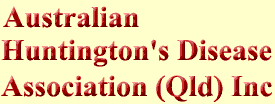
|
December 2001 - Newsletter
In this issue:
- President's Message
- From the Welfare Staff
- Regional Support Groups
- 25th Anniversary Dinner Candle Lighting Ceremony
- 25th Anniversary Dinner, Photos
- Young People and HD - Communicating Risk
- Find Your Spirit for Life
- Fundraising
- For Your Diary
- Management Committee & Staff
Dear Friends,
The 25th Anniversary Celebrations for the Queensland Association held on the 28th and 29th September were well attended and most successful. I would like to congratulate each of our new Life Members and Honorary Members who received their awards at the Dinner. I would also like to pay a special tribute to Cliff Farmer and our Association staff for the planning and organisation of both the Anniversary Dinner and Seminar.
As you may have been aware 2001 is the "International Year of Volunteers". I would like to highlight the work of our special volunteers throughout Queensland who assist the Association with tasks such as fundraising, respite holidays and the like. Thank you for your assistance and support.
The Australian Law Reform Commission and the Australian Health Ethics Committee are conducting a joint inquiry into the protection of Human Genetic Information. They will be holding public forums throughout Australia in the coming weeks and I would welcome you all to make any contributions to this, either directly or by contacting the Association. The HD Associations and professionals worldwide have been instrumental in many areas such as the protocol for genetic testing. Vigilance in this area has ensured the necessary confidentiality of any genetic information belonging to our families.
This will be the last Newsletter for the year and I would like to extend my best wishes to you all for the Festive Season.
Gerry Doyle, President
As this is our last Newsletter for the year I have decided to reflect and project on our work in the Welfare area in Queensland. Both Cathy and I have travelled quite a lot this year, and to give you some idea of our work and how it happened, I will explain.
Both Cath and I visited Mackay on separate occasions in February and September. This was due to the increase in the number of families in that area. Two overnight trips were made to Toowoomba and surrounding areas during March and October and also 2 trips as far north as Bundaberg, working with families north of Caloundra on the way. These trips involved 5 or 6 days and took place during March and July.
Townsville has been visited on 3 occasions during March and July and a short visit in November. We have worked in Cairns during March and November and like Mackay the additional visit in that area was due to the increase in family members. Cathy makes regular visits to the Gold Coast and when we consider the number of new referrals to our Welfare Service, a large percentage of them are from the Gold and Tweed Coast areas.
I am responsible for the care and concern of families on the Sunshine Coast, and I must admit I have not visited as regularly as I would have liked. I am very grateful to Iris Simpson who is very involved in providing support to families in that area and we work together to do our best to be available if and when required. I will try to improve my performance next year!
We hosted one respite holiday at the Gold Coast in May this year, during which the attendees enjoyed a visit to Sea World to see, among other things, 'The Polar Bears'.
In addition to our work in regional areas of Queensland, we endeavour to meet the needs of all of the families involved with our Association, and to keep them up to date with research and information. Cathy attended the I.H.A Conference in Denmark and we participated in the planning and presentation of the Dinner and Seminar to celebrate our 25th Anniversary in Queensland.
As the year draws to a close we are planning to enjoy lunch with family members from the Sunshine Coast, the Gold Coast and the Redlands. Early in November we met with folk in the Tweed - Kingscliff area. This was the last (for 2001) of three 'get togethers' during the year which took place at the Kingscliff Bowls Club with families and friends travelling from Byron Bay, Murwillumbah and Mullumbimby.
We have found the informal setting of these family meetings to be extremely beneficial and we look forward to conducting meetings in other areas in the New Year.
Before Christmas we hope to visit folk living in low and high level care accommodation. Christmas can be a lonely time for some people, so we hope a cheerful smile from a "Friendly Welfare Worker" may brighten a day for our friends in "care".
On behalf of Cathy and myself, may I wish you and yours a Healthy, Happy and Hearty Christmas and New Year, and we look forward to working with you in the weeks and months ahead.
Kind regards,
Gwen Pratten, Welfare Coordinator
Townsville Support Group - The last half of the year is nearing an end and Christmas is just around the corner.
Fundraising: The Group has been extremely busy fundraising since July 2001. Once again we are assisting the Barrier Reef Lions Club in selling tickets in their Community Art Unions. This has been very successful in the past.
Welfare Activities: Welfare activities on Tuesdays have been well attended. Some of the activities included: Picnic in the Park, Tenpin Bowling, Mini Golf, Lunch at the RSL Centre and the Movies.
Gavan Cox-Sutton travelled to Brisbane in September and while there he represented the Townsville Support Group at the 25th AHDA Qld. Anniversary. He will give an address on the Dinner and Seminar at the next meeting held on the 15th November. Gwen Pratten and Cathy Dart, AHDA Qld. Welfare Staff from Brisbane, will be attending this meeting so please come along.
Christmas Celebrations: Jean Paterson is organising a tour of the City Christmas Lights this year for clients and families. Our Christmas Breakup Luncheon is once again being sponsored by the Barrier Reef Lions Club - this is a time for all to come along and celebrate during the festive season.
Respite Camp 2002: Planning for the Respite Camp in May 2002 is well under way and an announcement of the location and times will be made in the New Year.
Vic Wakefield, Chairperson
.
Bundaberg Support Group - Christmas is closing in quickly and I would like to take this opportunity to wish everyone a Merry Christmas and best wishes for the New Year. The Bundaberg Group is having a Christmas Break-Up at Tri-Care Nursing Home for our folk in early December. We look forward to seeing readers from Bundy there.
Once again it has been a successful year for the Group. Our last raffle proved worthwhile and the Rotary Trailer Raffle is currently on the go and doing well. Nancy is busy selling tickets again. We appreciate the time and effort she contributes to the Group, and also thank the volunteers who assist her. They visit the care facilities, take people for outings, morning teas etc. A big thank you to Nancy and Co!
Thanks also to Fran for keeping our records in order and our books up to date. Once again, we are grateful to Ros and Co. at Gracie Dixon Respite Centre for their continued support.
We also extend our thanks to Barb, Gwen and Cathy from the Brisbane Office for their help over the past year. Last, but certainly not least - to our valued supporters who assist with fundraising, volunteering and attend our meetings - we thank you for your time and commitment throughout the year.
Have a safe and healthy break and we'll see everyone back next year.
Jenny English, Chairperson
Anne Middleton, of the South Australian HD Association, was elected to the Board of the International Huntington Association at the Business Meeting in Copenhagen.We extend our congratulations and best wishes to Anne on her appointment.
25TH ANNIVERSARY DINNER
CANDLE LIGHTING CEREMONY
Written by Cliff Farmer
It has become the practice among Australian HD Associations to celebrate their 25th Anniversaries with the lighting of candles.
This derives from the slogan of "It is better to light a candle than remain in the dark". We intend to continue the practice.
1. The Association was formed on the 24th September, 1976 after two public meetings held at what was CSR House at Auchenflower. Present at those meetings, a member of the inaugural committee and the only person to be a committee member continuously was Eunice Brooks and I'll ask Eunice to light the first candle.
2. The Association considered that education and the conduct of seminars was a constructive way to establish itself and it ran its first of several seminars at the Park Royal Hotel to celebrate its first anniversary on the 24th September, 1977. Ron Eley has been a key supporter of this type of activity and I would ask Ron to light the next candle.
3. Holiday weekends were also recognised as a major contribution we could make to the lives of both Huntington's clients and their carers. The first weekend was held at the Multiple Sclerosis home at Hollywell on the 12th and 13th November 1978. Russell Chamberlain wasn't with us at that time but he has been a happy participant at many weekends and I would ask Russell to light the next candle.
4. In November 1979 the 1st Australian Huntington's Disease Conference was held at Mary's Mount in Melbourne. Five representatives went from Queensland; we made some enduring friendships and were greatly enthused by Marjorie Guthrie who also attended. I, (Cliff Farmer), have been nominated to light the candle, as I was one of the participants.
5. Having enough money to do the things you have to do is critical to the success of any organisation like ours. This was recognised early in our life and from the beginning raffles and street stalls and the opportunity to participate in the Spring Hill Fair became an important part of our activity. This has continued to this day. A keen worker at our fundraising events over the years has been Anita Smith and I would ask her to light the next candle.
6. The Association has always acted in a way designed to obtain the respect of Government, Institutions and the Medical Profession. There is no better way to measure the regard of Government for your efforts and contribution than through your ability to obtain their support. The support is now considerable, but it commenced in September 1985 with a small grant of $1,000. Olive Blackmore was a Committee member and Secretary during those times and I would ask her to light the next candle.
7. Prior to the gene discovery, the existence of a family history was an important element in the diagnosis of Huntington's Disease. A Family Register, primarily the work of Drs. David Wallace, Neville Parker and Chev Kidson provided the authoritative resource in this work. In 1987 it was transferred to the care of Christine Oley who had joined the Mater Mothers Hospital as a Medical Geneticist. I would ask Christine to light the next candle.
8. On 3 August 1987 Gwen Pratten joined us as Welfare Coordinator and effectively established the unique Welfare Service which has formed the basis of our greatly valued client service ever since - I'd ask Gwen to light the next candle.
9. In August 1988 Alan Sivell, one of our clients and great friends had some good fortune financially and elected to share it with the Association by way of a significant gift. Alan's confidence in the Association and support were of tremendous encouragement to us all and I for one will never cease to be grateful to him. I'd ask his son Richard Sivell to light the next candle.
10. In August 1988 the Association became incorporated. This was a major and necessary structural change, which enabled us to go forward developing our services with confidence. Maida White who was our inaugural secretary was again secretary and did an enormous amount of work to achieve this result. Our membership had passed 100 and had reached 120. (It has now grown to almost 500). In asking Maida, one of our Life Members, to light the next candle I would also like to thank her for the research she did for this presentation.
11. On the 2nd May, 1989 we established our office in Friendship House, (the home of the Queensland Association for Mental Health and a dream come true of the Revd. Tony Bagnall who wrote to us on this occasion). Our first Administration Officer was Alison Hopgood who previously had served as secretary and fundraiser extraordinaire. I would ask Alison to light the next candle.
12. During 1988 and 1989 the importance of holding support meetings to welcome new families, help with their understanding of the illness and provide the mutual support so necessary became a focus. This task was willingly and effectively taken on by Ray Bellert who I would ask to light the next candle.
13. Throughout the world the close relationships between doctors, other health professionals working with families affected by HD and associations is legend. In Brisbane the closeness of this relationship has been extremely significant from the earliest days. It is most visible through the work of the Professional Committee, which now meets about six-monthly. The Committee did an enormous amount of work, particularly between 1989 and 1994 in preparing protocols for presymptomatic Testing and the program for the 1994 Conference. A leader in this area has been Professor Joan Lawrence, one of our Honorary Members, and I would ask her to light the next candle.
14. In 1990 a young doctor joined us and was later given the task by the Director of Mental Health, Dr. Perce Tucker, to establish the Aspley Day Clinic to provide specialist services not only to people living in that region, but to provide a state-wide service. This young doctor, who today probably sees more Huntington's Disease patients than any other doctor, was Arnold Waugh and I would ask Arnold to light the next candle.
15. Soon after in August 1991 Iris Simpson was appointed to the Clinic staff and one of her first initiatives was to establish the first Day Respite Centre for Huntington's Disease in Queensland at Caboolture. I would ask Iris to light the next candle.
16. In February 1992 another significant step was taken in establishing the Townsville Support Group. In just a few months this group celebrates its tenth anniversary, but this weekend they are celebrating our twenty-five years with a barbecue. They nominated Gavan Cox-Sutton to join us tonight and I would ask Gavan to light the next candle.
17. 1993 was the year which will stand like a beacon for those involved with Huntington's Disease. The gene was isolated and this event provided the strongest hope for a cure ever experienced. The isolation was announced at the joint IHA-WFN meeting in Boston which Gwen attended and where Robyn Kapp, our friend for many years and who has joined us tonight from Sydney, was appointed IHA President I would ask Robyn to light the next candle
18. March 1994 saw the Association run Day Respite Centre established at Friendship House. This centre now operates on one day per week out of the Huntington's Disease Centre over the road. Rob Farmer has been a regular volunteer at the centre and I would ask Rob to light the next candle.
19. The Huntington's Disease Conference was held in Brisbane at the Wesley Hospital in 1994. A feature once again as in previous Brisbane seminars was a family panel. One of the participants in the panel was Lesley Black and I would ask Lesley, a long-standing Committee member to light the next candle.
20. In May 1996 we established our second regional Support Group in Bundaberg. This group operates in a vastly different way to our Townsville Group but makes a significant difference to those people in that area. Nancy Swanson was planning on being with us tonight but is quite unwell. We are fortunate that Ailsa Humphreys, a carer from Maryborough and her husband Rex are able to be with us and I would ask Ailsa to light the next candle.
21. As I mentioned earlier, fundraising is critical to an organisation like ours. This aspect of the Association's affairs underwent a quantum change with the advent of Telemarketing and the associated donation base that it provided in October 1996. Helen Johnston joined us at that time to carry out all the administration associated with it which is so critical to maintaining a satisfied client base. I would ask Helen to light the next candle.
22. In May 1997 we achieved one of our key goals, a place we could call home and provide a base for our administration for the delivery of our services throughout the State. Florence Dannell House became a reality through the generous bequest of Florence Dannell and much determination and hard work. The Honorary Architect for this project was Robert Hopgood and I would ask Robert to light the next candle.
23. Together with fundraising, excellent administration and communications are critical to an Association like ours. Barbara Gray has been the Administration Officer for the past five years and has been instrumental, together with the State Library of Queensland, in establishing an award winning Web Site to assist families and others throughout the State. I would ask Barbara to light the next candle.
24. In September 2000 Family Support Meetings commenced on the Gold Coast and improved services were provided to the many families living in that area and the Tweed District of New South Wales. Cathy Dart is our Welfare Officer who has led this initiative and I would ask Cathy to light the next candle.
25. Tonight, on the 28th September 2001, the Association is celebrating its 25 years of making a difference to families affected by HD in Queensland. Much has been achieved, but much still remains to be done. Heading the Association's list is the provision of specialist care facilities for Huntington's Disease clients in Queensland. The person providing leadership at this time is our President, Gerry Doyle and I would ask Gerry to light the next and twenty-fifth candle.
At the 25th Anniversary Dinner held on the 28th September, 2001 Eunice Brooks, Alison Hopgood and Gwen Pratten were made Life Members of the Association and Christine Oley, Iris Simpson and Arnold Waugh were made Honorary Members of the Association.
All have made a tremendous contribution to the Association over many years - we recognise their services and thank them for "Making a Difference".
25th Anniversary Dinner - Photos
Honorary Members receiving their awards:
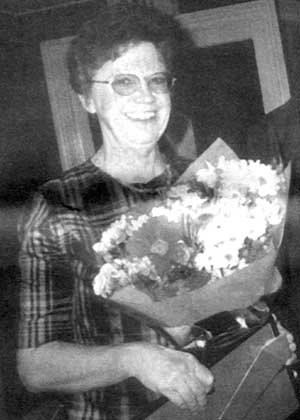
Christine Oley
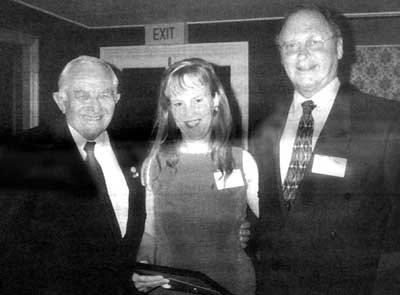
Iris Simpson (being congratulated by Life Member Cliff Farmer and President Gerry Doyle)
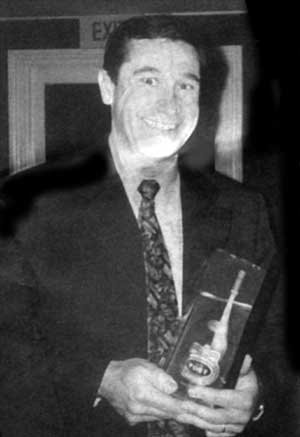
Arnold Waugh
Candle Lighting Ceremony
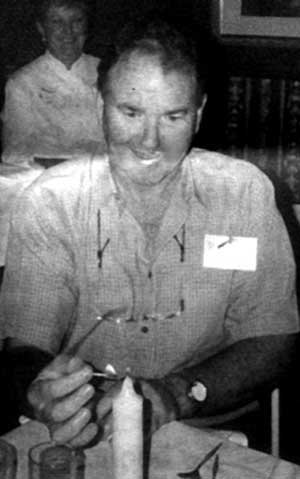
Gavan Cox Sutton (Townsville Support Group)

Ailsa Humphreys, representing Bundaberg Support Group
Life Members:
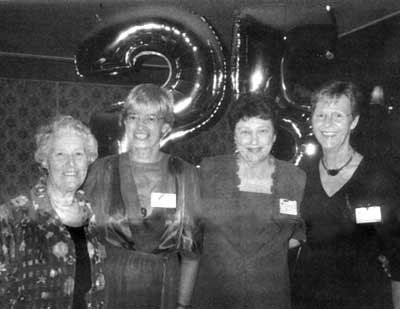
Maida White, Alison Hopgood, Eunice Brooks & Gwen Pratten

Interstate visitor Robyn Kapp (NSW) contributing corks to Gerry Doyle for our Cork Recycling Program
Eunice Brooks, Ron Eley and Margaret Bargewell
Retiring Committee Members September 2001
YOUNG PEOPLE AND HD
COMMUNICATING RISK
One of the most common questions asked is when and how do we tell the children?
Almost all of the articles and books I have read give one resounding answer - "As soon as possible!" There are few variations on this advice, and I will try to explain why.
The theories leading to this advice are based on the idea that children's developing awareness incorporates 'bigger' concepts piece by piece (a little at a time) and normalises them as part of their life schema. Children develop awareness of the things around them, ie their own bodies, their parents, their homelife; at increasing levels of understanding at a relatively fast pace over a few years. Parents and teachers learn to present information in 'developmentally related concept topics' and adapt these 'teaching methods' as their children grow. Thus children develop a schema about 'The World, Themselves and Life'.
For example: Children will eventually realise that their skin colour is different to that of some others. Children will eventually learn to discriminate between different socioeconomic groups etc etc. And some children will recognise that they are 'different' in obvious ways to others: perhaps their physical disability does not enable them to be involved in the same activities as other children. Or perhaps one of their parents is ill and behaves very differently to other parents.
Research and experience has taught us that these children cope best when their awareness is raised as a natural progression of their own individual development.
This process is augmented by sensitive and timely education provided by parents and professionals. Children who grow up with a good understanding of HD are often much more comfortable with this reality than adults and children who learn about their risk later in life. In time all children and adults will learn to feel more comfortable with the knowledge of HD, often they use this knowledge to make very positive lifestyle decisions.
Education for Young People
Education is such an important topic, I cannot emphasise enough the necessity of clear, concise and well-informed education. Children like adults will often 'imagine the worst case scenario' particularly when they have just a little bit of information, and in many cases 'imagining' or 'filling in the gaps' can produce a much worse picture than the reality. I have met many families where children have perhaps 'chosen not to access' or 'not been encouraged to access' information about HD. Sometimes I have discovered that these children held rather distorted views about HD, and very often I have found that their information has been a secret from their friends and sometimes even family members. Education helps to dispel secrets and removes stigma so often attached to 'difference'.
Obviously education does not fix HD, education cannot dispel all fears, and it cannot make the 'perceived threats' go away. Education can only make 'us' - children, parents, friends and professionals etc 'more comfortable' with the facts. Always education should include discussion about appropriate supports and appropriate actions should certain issues come up.
There are many modes of HD education
Both the Parents and Children should be involved in seeking and selecting the information materials they use. The Association is a great place to start. We are happy to offer individual and group sessions for young people and their families or significant others. As far as possible we try to provide a flexible service to meet the needs of all persons who contact the service. So we conduct these sessions not only at the office, but in home, at schools, at MacDonalds, at the park - wherever the children and their family choose to meet us. There are of course many other options to obtain information including the internet, libraries, support groups etc.
The literature produced at the Association also provides a range of educational levels in booklet or pamphlet form. There are also videos and books available on loan through our library. In particular I would like to highlight the publication produced in New Zealand last year, "Huntington's and Me; a guide for young people". This is a wonderful book that was coproduced by Alison Gray and Dorothy Tortell.
Dorothy is a social worker for the Wellington Association who has for the last 7 years conducted a very successful annual camp for young people who live in families with HD. Many of these children contributed to the writing of the book.
I would be very happy to hear from anyone who would be interested in initiating and participating in such a camp here in Queensland.
Age and development dependent
Parents, carers and professionals, we must all learn to be sensitive to the learning needs of each child. Overloading with information can be just as dangerous as not providing enough information. Therefore family discussions should not be avoided when initiated by children but monitored closely for length and depth of discussion, carefully assessing the levels of interest and involvement. We must all be aware of enforcing unwanted information and the nature of our own agendas.
Juvenile HD
Occasionally we are asked about early onset or juvenile HD and always we must admit that we do not know a lot about this topic. This could be seen as a positive - our association has had contact with only a few persons who have developed symptoms before they are 25 or 30 years of age. Therefore there has not been a high incidence in Queensland. However I have heard that in other states and more often in other countries there have been a higher number of children diagnosed with Juvenile HD.
When Dr George Huntington first identified HD in 1872 he was not aware of the juvenile presentation of the disease.
It is now known that HD can occur in individuals younger than 5 yrs of age. Juvenile HD is characterised by a movement disorder that is a little different to that of affected adults. The earlier the disease onset, the more likely it is that the child will be very rigid and less likely to have chorea. Epileptic seizures occur in approximately 25-30% of cases and changes in behaviour and mental function are common.
Some publications have indicated that Juvenile HD may account for up to 10% of diagnosed cases of HD, however our numbers and experience in Queensland would indicate that the ratio is much less than that and we would estimate only 1-3% - questionable?
Clinical Diagnosis of HD in children or adults should only ever be considered and initiated when all other alternatives have been exhausted.
Conclusion
I am sure that there are many issues that young people may need to confront when they are learning about Huntington's Disease. Often they are sharing a home with or maintaining a relationship with a parent or relation who is affected by HD at the same time. Some young people are extraordinarily good at maintaining a wonderful relationship with their parent who is affected by HD. Some young people find even minimal contact very very difficult. There are many many background issues that may influence these relationships. In our next newsletter I would like to discuss the issue of communication as this skill provides the basis for all relationships and learning to adapt could be the key to success.
Acknowledgements: Presentation by Cathy Dart at the 25th Anniversary Seminar held on the 29th September, 2001.
When I meet people, I always like to discover what they are passionate about in their life. Whether it is their children or partner, their work, their hobbies or interests, people tend to find it easier to talk when sharing that which is quality to them. If people ask me about my passions, I could quite happily talk for hours about my wife and son, my love for dancing, the satisfaction gained from my work.
Happy people tend to have found what they are enthusiastic about in life. Sadly, many people do not know what their passions are, or are not currently following their interests. It can help to consider what you were once passionate about in your past and to consider doing elements of this activity or something similar again. Or it can help to embrace change and to try some new activities which may ignite your passions. The community newspapers, neighbourhood centres and TAFE colleges are some great places to get some ideas on new activities.
Some of us feel trapped in jobs in which we are miserable. If we are able to work in the field we are passionate about, and get someone to pay us for doing it, we tend to be satisfied in the work we do. Or at least by pursuing our interests, it can make the unbearable bearable.
Passions are good servants, but bad masters. If we let them dominate our life, we end up living our life out of balance. Although passions may be need-satisfying, to have happy relationships, we also have to show consideration for the needs of others. However, if we sacrifice pursuing our passions out of consideration for others, we can lose our sense of ourselves. Obviously, a balance is called for.
I have discovered that those people who do best recovering from alcohol and drug dependence tend to do so when they have discovered a passion. It may be involvement with others, their spirituality, a sense of purpose, or even a simple interest like photography. Rather than trying to fill themselves with the spirit of the bottle, they have found their spirit for life.
About the Author - Ken Warren (BA, M Soc Sc, CPC, AAMFC QCA) is a Certified Professional Counsellor in private practice on the Sunshine Coast (Qld). He can be contacted on (07)5443 7626 or through his email address [email protected]
YOUR LINK TO LIVING INDEPENDENTLY
Anyone can use a Commonwealth Carelink Centre to obtain free information.
Centres provide information about:
· The range of services available in your community and how to contact them;
· Who is eligible to receive the services;
· Whether there are any costs associated with receiving the services; and
· Aged Care Assessment services whose assessment is required for access to a Community Aged Care Package or entry into an aged care home.
Freecall TM
1800 052 222
Since the last Newsletter several events and fundraising activities have taken place. These include the Bayside Spring Festival, the Melbourne Cup Calcutta and the Cookie Drive. We extend our appreciation to readers who supported these activities either as volunteers or by their participation. Approximately $1000.00 was raised at the Melbourne Cup Calcutta. The Cookie Drive is still in progress as the Newsletter goes to print; however we expect to raise in the vicinity of $300 - $400.
Christmas Cakes & Puddings - Support the AHDA (Qld) and the Acacia Ridge Rotary Club by placing an order for Christmas Cakes and Puddings. Cost - $10.00 each. Ring Barbara at the Office to place your order; the goods will be available for collection a few days after your order is received.
Future Fundraising Activities -
Our program for 2002 is still being drawn up, however it is anticipated that the Association will run a raffle fairly early in the year. The February edition of the Newsletter will have more details.
Community Assistance - Recently we have received, and gratefully acknowledge here, major financial assistance from the following donors:
Busy Bee's Linen
E. McKenzie
I. Spence
Cork Recycling Program - Assist the Association by collecting wine corks from your friends, workplace etc.
Corks collected on our behalf are sold to a company in Brisbane and remanufactured. Products such as gasket kits for motor vehicles; horse-float mats; StandEasy mats used at supermarket checkouts, assembly lines and machine shops; cricket ball inners and a range of safety flooring all incorporate corks recycled through this fundraising program.
For further information please contact Barbara at the HD Office.
January 15 Management Committee Meeting - 6.00 pm at HD Centre, Annerley
January 30 Professional Committee Meeting - 6.30 pm at HD Centre, Annerley
February 12 Bundaberg Family Support Meeting - 7.00 pm at Railway Hotel, Bundaberg
February19 Management Committee Meeting - 6.00 pm at HD Centre, Annerley
February19Townsville Family Support Meeting
MANAGEMENT COMMITTEE
At the Annual General Meeting held on the 29th September this year, the Management Committee for the forthcoming year was elected. Our current Committee is as follows:
| President | Mr. Gerry Doyle |
| Vice-President | Mr. Ray Bellert |
| Honorary Secretary | Mrs. Alison Hopgood |
| Honorary Treasurer | Mrs. Jan Mealy |
| Committee Members | Mrs. Lesley Black, Mrs. Anita Smith and Mrs. Mary Steptoe. |
| Bundaberg Family Support Group - Office Bearers | |
| Chairperson/Secretary | Mrs. Jenny English |
| Treasurer | Mrs. Fran Cassidy |
| Welfare Service - Volunteer | Mrs. Nancy Swanson |
| Townsville Family Support Group - Office Bearers | |
| Chairperson/Treasurer | Mr. Vic Wakefield |
| Secretary | Mr. Bill Klaassen |
| Welfare Contact | Mrs. Jean Paterson |
| STAFF | |
| Welfare Coordinator | Ms. Gwen Pratten |
| Welfare Officer | Ms. Catherine Dart |
| Day Respite Centre | Mrs. Kaye Evans |
| Mrs. Diane Murtha | |
| Mrs. Jasmine Gejas | |
| Administration Officer | Mrs. Barbara Gray |
| Telemarketing Administrator | Mrs. Helen Gray |
Christmas is a time for pausing to reflect on our achievements for the year,appreciate the things around us andshare the joy of the Season with the people we love.

